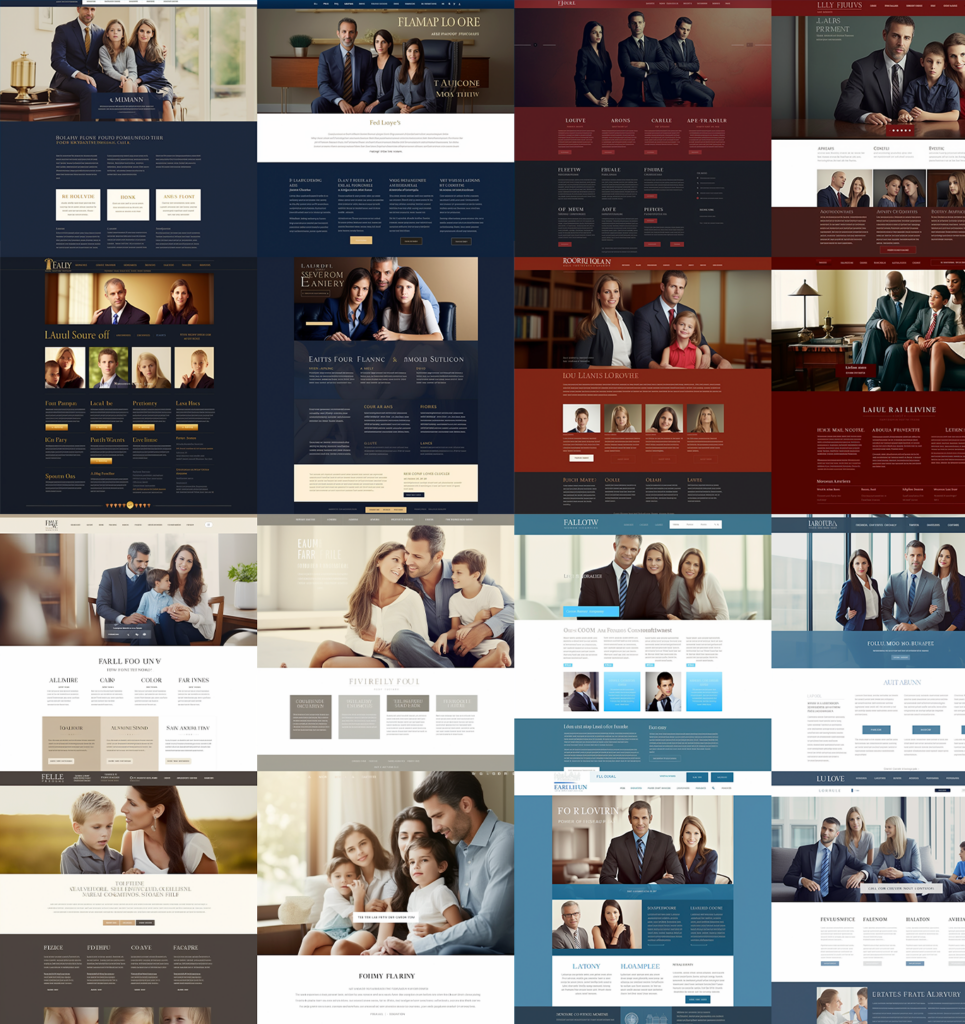How to Choose the Best Family Law Website Template

If you are a family lawyer looking to build a website for your practice, choosing the right template can be overwhelming. There are so many options out there, and it can be difficult to know where to start. In this article, we will provide a comprehensive guide on how to choose the best family law website template for your practice.
Understanding Your Needs
Before you start browsing for website templates, it is essential to understand your needs. You need to have a clear idea of what you want your website to accomplish and what features you need to include. Here are some questions to ask yourself:
What is the Purpose of Your Website?
Is your website primarily to showcase your expertise and experience, or is it more focused on attracting new clients? Do you want to provide legal information to potential clients or build a community of people interested in family law? Understanding the purpose of your website will help you choose the right template.
What Features Do You Need?
Do you need a blog to regularly post legal updates and news? Do you want to include an appointment booking system or contact form? Make a list of the features you need, and look for templates that include those features.
What Design Aesthetics Do You Prefer?
Do you prefer a more traditional design or something modern and minimalist? Do you want to include images of families or focus more on legal imagery? Understanding your design preferences will help you choose a template that fits your style.
Factors to Consider When Choosing a Family Law Website Template

If you’re a family law attorney looking to build or redesign your website, it’s important to choose a template that meets the unique needs of your practice. With so many options available, it can be difficult to know where to start. In this article, we’ll explore some of the key factors to consider when choosing a family law website template.
1. Responsive Design
In today’s mobile-driven world, it’s essential that your website looks great and functions properly on all devices, including desktops, laptops, tablets, and smartphones. A responsive website design ensures that your site will adjust to fit any screen size, providing a seamless user experience for your visitors.
2. Family Law Website Template Customizability
While templates can save you time and money, you don’t want your website to look like everyone else’s. Look for a template that allows for customization, including options for colors, fonts, and layouts. This will help you create a unique online presence that reflects your brand and values.
3. User-Friendly Navigation
Your website should be easy to navigate, with clear and intuitive menus that guide visitors to the information they need. Look for a template that offers a logical and user-friendly layout, with easy-to-find contact information and a prominent call-to-action.
4. Content Management System
A content management system (CMS) allows you to easily update and manage your website content without needing technical expertise. Look for a template that integrates with a popular CMS like WordPress or Drupal, or includes its own user-friendly CMS.
5. Search Engine Optimization (SEO)
Having a beautiful website is great, but it won’t do you much good if potential clients can’t find it. Look for a template that is optimized for search engines, with clean code, fast load times, and built-in SEO features like meta tags and descriptions.
To learn more about how SEO can be used for family lawyers, check out our SEO Blog.
6. Social Media Integration
Social media can be a powerful tool for promoting your family law practice and connecting with potential clients. Look for a template that integrates with your social media profiles, making it easy for visitors to follow you and share your content.
7. Testimonials and Reviews
Word of mouth is a powerful marketing tool, and online reviews and testimonials can help build trust and credibility with potential clients. Look for a template that includes a built-in testimonial or review feature, or that allows you to easily integrate third-party review sites like Yelp or Avvo.
8. Security Features
Your website is a reflection of your practice, and you want to ensure that it’s safe and secure for both you and your visitors. Look for a template that includes security features like SSL encryption and regular software updates to protect against hacks and malware.
9. Analytics and Tracking
Understanding how your website is performing is essential for making informed decisions and optimizing your online presence. Look for a template that includes built-in analytics and tracking tools, or that integrates easily with popular platforms like Google Analytics.
10. Support and Documentation
Even with the best template, you may run into questions or issues along the way. Look for a template that includes comprehensive documentation and support options, including tutorials, forums, and dedicated customer service.
By considering these factors when choosing a family law website template, you can ensure that your online presence is professional, user-friendly, and optimized for success.
Best Family Law Website Templates
Now that you know what to look for in a family law website template, here are some of the best options available:
Divi
Divi is a popular WordPress theme that is highly customizable and easy to use. It includes a drag-and-drop page builder, making it easy to create custom layouts. It also includes built-in SEO optimization, making it easy to rank in search engine results pages.
Avada
Avada is another popular WordPress theme that is known for its versatility and customizability. It includes a wide range of pre-built templates, making it easy to find one that fits your needs. It also includes built-in SEO optimization and responsive design.
Themeforest Law Firm
Law Firm is a WordPress theme specifically designed for law firms. It includes a range of pre-built templates that are focused on legal imagery and features like appointment booking and contact forms. It is also optimized for SEO and responsive design.
Conclusion
Choosing the right family law website template can be overwhelming, but by understanding your needs and considering factors like responsive design, ease of use, customizability, SEO optimization, and support and updates, you can find a template that fits your practice’s unique needs. Divi, Avada, and Law Firm are just a few examples of the best family law website templates available. By choosing the right template, you can create a professional and effective website that helps you attract new clients and showcase your expertise in family law.
FAQs
- Do I need a website for my family law practice?
Yes, having a website is essential for any business, including a family law practice. A website helps you establish an online presence, showcase your expertise, and attract new clients. - Can I create a website for my family law practice without any coding experience?
Yes, there are many website builders and templates available that make it easy to create a website without any coding experience. - What are some essential features to include on a family law website?
Some essential features to include on a family law website include a clear description of your practice areas, information about your team and experience, client testimonials, and a contact form. - How often should I update my family law website?
It’s a good idea to update your website regularly with new content, such as blog posts or legal updates. Aim to update your website at least once a month to keep it fresh and engaging for visitors. - Should I hire a professional web designer to create my family law website?
While it is possible to create a website on your own using a template or website builder, hiring a professional web designer can help ensure that your website is effective, user-friendly, and reflects your practice’s unique brand and style.

Leave A Comment